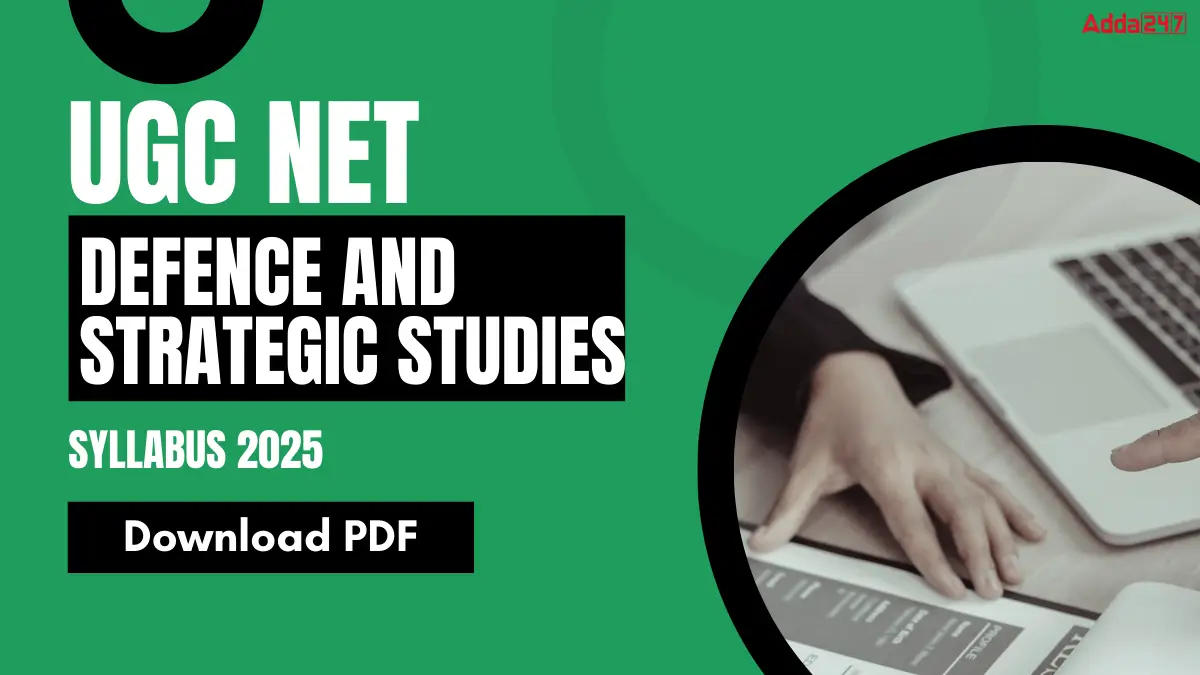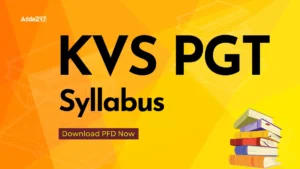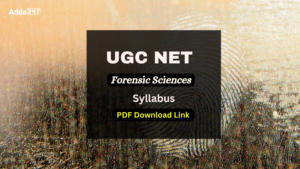Table of Contents
The UGC has released the syllabus for UGC NET Defence and Strategic Studies 2025. The UGC NET exam is divided into two sections: Paper I and Paper II. To effectively prepare for the UGC NET exam, candidates should familiarize themselves with the exam pattern and the specific topics outlined in the UGC NET Defence and Strategic Studies syllabus.
This article provides a downloadable version of the UGC NET Defence and Strategic Studies Syllabus 2025 in both Hindi and English, facilitating candidates’ exam preparation. Let’s delve into a comprehensive overview of the UGC NET Defence and Strategic Studies Syllabus 2025, including essential topics and sections for achieving improved results
UGC NET Defence and Strategic Studies Syllabus 2025 – Overview
Candidates who are looking for the UGC NET Defence and Strategic Studies Syllabus & Exam Pattern have come to the right destination. Papers I & II Syllabus is available on this website. Here, we’ll provide all the details you need to go through for the UGC NET Defence and Strategic Studies Exam 2025.
| UGC NET Defence and Strategic Studies Syllabus | |
| Exam Name | UGC NET 2025 |
| Conducting Body | National Testing Agency |
| Subject | Defence and Strategic Studies |
| Category | Syllabus and Exam Pattern |
| Location | National Level |
| Paper I | 50 |
| Paper II | 100 |
| Official Website | https://ugcnet.nta.ac.in/ |
UGC NET Defence and Strategic Studies Syllabus
Candidates must be thoroughly prepared for the extensive UGC NET to be eligible for the UGC NET Exam. UGC NET Paper 1 lasts for one hour and carries a total score of 100 and UGC NET Defence and Strategic Studies i.e. Paper 2 has 200 marks questions and lasts two hours. The UGC NET Defence and Strategic Studies 2025 exam syllabus won’t vary from what it has been in recent years. Candidates ought to start their study preparation with the subjects that weigh the most in terms of marks in the syllabus.
UGC NET Defence and Strategic Studies Exam Pattern 2025
The UGC NET Defence and Strategic Studies Syllabus is vast, thus preparation for the exam must begin early. A number of vital subtopics are also covered in the UGC NET for Defence and Strategic Studies Subject syllabus for smooth exam preparation. The UGC NET Defence and Strategic Studies Syllabus presented here will help you identify the important parts of each topic and create a concrete study schedule.
UGC NET Defence and Strategic Studies Syllabus for Paper II
The UGC NET Defence and Strategic Studies exam’s Paper II will cover 10 units. The candidate may choose from these. This test will comprise 100 questions, each worth two marks. Every question is compulsory to attempt. Below is the detailed syllabus available for the UGC NET Defence and Strategic Studies Syllabus PDF for Paper II that candidates can review.
UNIT- I THEORIES AND CONCEPTS
- Defence and Strategic Studies: Assumptions and Approaches.
- The Concepts of Nation
- Key Concepts of National Security
- National Security Concerns of Major Powers, Middle Powers and Small Powers
- National Security Structures
- National Security Environment: Internal and External
- Defence, Foreign, Security and Domestic Policies
- Military Alliances and Pacts, Peace Treaties, Defence Cooperation, Strategic Partnership and Security Dialogue.
- Non–Alignment, Balance of Power, Collective Security and Balance of Terror – Concept, Development and Relevance.
- Deterrence and Détente: Concept and Contemporary Relevance
UNIT – II STRATEGIC THOUGHT
- Contribution of Sun Tzu,
- Kautilya,
- Machiavelli,
- Jomini,
- Carl von Clausewitz,
- General Giulio Douhet
- W.Mitchell,
- J.F.C.Fuller,
- Capt.B.H.Liddell Hart,
- Marx, Lenin, Mao Zedong and Che Guevara.
- Nuclear Deterrence: Andre Beaufre, Henry Kissinger and K. Subrahmanyam.
- Thoughts of Gandhi and Nehru on Peace, Security and Development.
UNIT – III WAR AS AN INSTRUMENT IN INTERNATIONAL RELATIONS
- Theories and Causes of War.
- Principles of War.
- Contemporary Warfare
- Armaments
- Military Alliances and Pacts, Peace Treaties, Defence Cooperation, Strategic Partnership and Security Dialogue.
- Terrorism
- Conflicting Ideologies
- Concept and Elements of Deterrence: Nuclear & Conventional.
- Evolution of Global Nuclear Doctrines
- Democratic Peace Theory
UNIT – IV WMD, NUCLEAR PROLIFERATION AND NATIONAL SECURITY
- Basic Concepts and Theory
- Historical Survey of Disarmament Efforts:
- Weapons of Mass Destruction: Nuclear, Chemical & Biological Weapons.
- Nuclear Arms Limitation Nuclear Arms Control Treaties.
- Chemical Weapons Convention and Biological Weapons Convention
- Concept of Non-proliferation, NPT, CTBT, PTBT MTCR FMCT, & other treaties
- Nuclear Export Control Regimes
- New Challenges and Responses – Missile Defense, Cooperative Threat Reduction and G-7 Global Partnership
- Disarmament & Arms Control and Economic Development
- Terrorism and Nuclear Proliferation.
- Concept of Star Wars and NMD
UNIT – V GLOBAL SECURITY CONCERNS
- End of cold war and emergence of new world order.
- Proliferation of Military, Nuclear and missile capabilities
- Environmental Issues
- Organized Crimes
- Migrants and Refugees
- Global Security Concerns
- Problem of System of Governance and Human Rights
- Food Security, Energy Security and Water Security problems in the modern era.
- Millennium Development Goals.
UNIT – VI INDIA’S SECURITY CONCERNS & POLICIES IN CONTEMPORARY INTERNATIONAL SCENARIO
- Genesis of Sino-Indian Relations
- The Boundary Dispute, Sino-Pakistan Nexus, OBOR and CPEC, China and India- Military Balance, Chinese Policy towards South Asia
- Rise of India and China
- Strategic Dimension of India- Pakistan Relations
- India and South Asia
- Making of India’s Defence Policy Since Independence
- India’s Look East and Act East Policies, Indo-Pacific Cooperation, Strategic Partnerships.
- India’s maritime security and strategy in the 21st century
- India’s Defence Doctrines and Strategies including Nuclear Doctrine
- Higher Defence Organization of India.
UNIT – VII ISSUES IN CONFLICT RESOLUTION
- Origin, Type and Structure of Conflict.
- Ideologies and International conflicts.
- Role of United Nations in Conflict Management and Re-Structuring of UNO
- Techniques of Conflict Prevention
- Conflict Management
- International Humanitarian Laws and Laws of Armed Conflicts.
- Confidence Building Measures: Concept, kinds and utility.
- IGOs & NGOs in Conflict Resolution: Peace Making, Peace Keeping and Peace Building.
- Gandhian Philosophy on Peace and Non-violence
- Nehruvian approach to National Security and Cooperation
UNIT – VIII DISASTER MANAGEMENT AND NATIONAL SECURITY
- Basic Concept & meaning of Disaster, Introduction to terminologies associated with Disaster and National Security: Natural and Manmade, Vulnerability, Risk etc., Identifying various types of Disasters.
- Natural Disaster and human-induced Disaster
- Study of Disaster in India / Around the World
- Disaster Management
- Institutional Mechanism for Disaster Management in India
UNIT – IX DEFENCE ECONOMICS
- Economic Theories of Defence.
- Sustainable Development: Challenges & Responses.
- Basics of Defence Planning, Determinants of Defence Expenditure.
- Defence Budgeting.
- Economic Causes of War.
- Economic Warfare in modern times.
- Economic Problems of Post-War Reconstruction.
- National Security and International Trade regimes (WTO, TRIPS, TRIMS, FTA’s NAFTA, SAPTA, & NSG).
- India’s Role in Regional and Global Economic Forums and Organizations.
- Geo-economics and its Implications for global/regional economic stability
UNIT –X SCIENCE & TECHNOLOGY AND NATIONAL SECURITY
- Broad Survey of Technological Changes from Industrial Revolution to Information Revolution.
- India’s Civil Nuclear and Space Programs, India’s Energy Scenario.
- Research and Development
- Impact of Economic Liberalization and Globalization
- Issues of Mobilization of Resources during War and Peace.
- Military Industrial Complexes.
- Transfer of Technology
- Interdependence and Cooperation at Regional and Global levels.
- Cyber Security
- Social Media and its Impact on National Security
Download UGC NET Defence and Strategic Studies Syllabus in Hindi and English
The direct link to download UGC NET Syllabus for Defence and Strategic Studies Subject in PDF in Hindi and English has been given below. Candidates can download the UGC NET Defence and Strategic Studies Syllabus in both languages. All the candidates can prepare with important topics and unit-wise detailed syllabi in the below PDFs. The link to download UGC NET Defence and Strategic Studies Syllabus PDF 2025 has been given below :
| UGC NET Defence and Strategic Studies Paper-II Syllabus PDF in Hindi and English | |
| UGC NET Defence and Strategic Studies Paper II Syllabus PDF in English | UGC NET Defence and Strategic Studies Paper II Syllabus PDF in Hindi |
Benefits of UGC NET Defence and Strategic Studies Syllabus 2025 PDF
Advantages of the UGC NET Defence and Strategic Studies Syllabus 2025 PDF include:
- Structured Overview: The PDF offers a structured and organized overview of the UGC NET Defence and Strategic Studies syllabus, making it easier for candidates to understand the scope of the subject.
- Convenient Access: The digital format allows candidates to access the syllabus anytime, anywhere, using their devices, which is particularly useful for quick references and last-minute revisions.
- Focused Preparation: The syllabus PDF helps candidates focus their preparation efforts by clearly outlining the topics and subtopics that need to be covered for the exam.
- Topic Prioritization: Candidates can prioritize their study plan by identifying important and high-weightage topics as per the syllabus, ensuring efficient use of their time and resources.
- Customizable Learning: Candidates can break down the syllabus into manageable sections, customizing their study schedule based on their strengths and weaknesses.
- Elimination of Redundancy: The syllabus PDF prevents candidates from studying irrelevant or outdated content, ensuring that their preparation aligns with the current requirements of the UGC NET Defence and Strategic Studies exam.
- Clear Expectations: The syllabus PDF sets clear expectations for candidates, allowing them to align their learning objectives and strategies with the specific content outlined by UGC.
- Resource Planning: With the syllabus in hand, candidates can gather and organize relevant study materials, books, and resources that directly correspond to the topics mentioned.
- Efficient Revision: During revision, candidates can quickly locate and review the topics they’ve covered, enabling them to refresh their knowledge effectively.
- Confidence Boost: Having a comprehensive syllabus PDF boosts candidates’ confidence as they can track their progress through the syllabus, ensuring that they’ve covered all the essential topics.




 KVS PGT Syllabus 2025, Download PGT Syll...
KVS PGT Syllabus 2025, Download PGT Syll...
 UGC NET Forensic Science Syllabus 2025 a...
UGC NET Forensic Science Syllabus 2025 a...
 UGC NET Visual Arts Syllabus 2025 PDF Do...
UGC NET Visual Arts Syllabus 2025 PDF Do...














